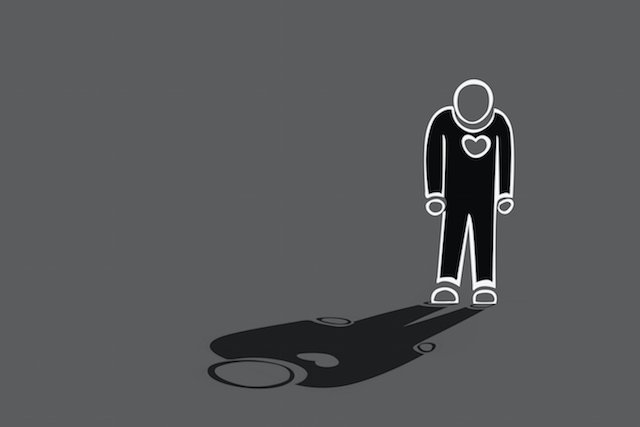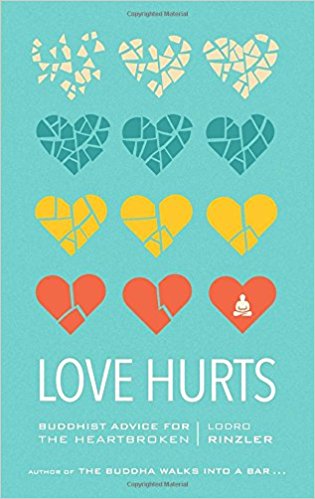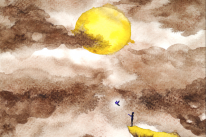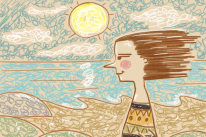
Note – The winners for this giveaway have been chosen. They are:
- Jennifer Moore Hardesty
- Margie Lynn
- Dr. Mac
- Ryan
- RB
- Justme
- Rogério Cardoso
- Fernanda Garza
- Benjamin E. Nichols
- Terri Cross
When you’re dealing with heartbreak, it can feel like the pain will never go away.
You may know, intellectually, that everything heals with time, but in that moment, when you’re suffering, it’s hard to hold onto hope.
Like all humans, I’ve experienced my fair share of loss, and I’ve felt scared, depressed, alone, betrayed, rejected, regretful, and angry—with other people, with myself, and with the world.
Losing someone or something that has become a part of your identity can feel like losing a limb, and how do you go on when you’ve lost a part of yourself?
I’ve learned that there isn’t a one-size-fits-all answer to that question. There’s no magic solution that helps us grow, let go, and move on. There are, however, lots of things we can do to help ourselves when struggling with the many nuanced emotions that come up when we’re grieving a painful loss.
Tiny Buddha contributor Lodro Rinzler has tackled these varied challenges in his new book, Love Hurts: Buddhist Advice for the Heartbroken.
This “short and compact first-aid kit for a broken heart” offers simple, practical wisdom to help you take good care of yourself and work through your pain.
With chapters that offer advice based on what you’re feeling, Love Hurts may just what you need to get through your hardest days and find a light at the end of the tunnel.
I’m grateful that Lodro took the time to answer some questions about his book, and also that he’s provided ten free copies for Tiny Buddha readers.
 The Giveaway
The Giveaway
To enter to win one of ten free copies of Love Hurts: Buddhist Advice for the Heartbroken:
- Leave a comment below (you don’t need to write anything specific—“count me in” is sufficient)
- For an extra entry, share this interview on one of your social media pages and post a second comment with the link
You can enter until midnight PST on Sunday, March 19th.
The Interview
1. Tell us a little bit about yourself and what inspired you to write this book.
I’m a meditation teacher and author. I grew up in the Shambhala Buddhist tradition, started meditating at the age of six, and have been teaching meditation for the last sixteen years under the guidance of my teacher, Sakyong Mipham Rinpoche. I’ve written six books on the topic and co-founded the network of meditation studios known as MNDFL.
On an outer level, I wrote this book because I work with a lot of people who are suffering from heartbreak and I wanted to talk to them directly, knowing that I couldn’t sit down and have tea with everyone.
On an inner level, for a man in his thirties I have known a lot of heartbreak. Yes, the romantic kind, but also from too many people who have died, many around my age, and from every day reading the news and my heart breaking anew, seeing how many people are perpetuating horror and terror on others due to discrimination.
On a secret level I wrote this because I needed to understand how heartbreak works, and writing is how I process information. That’s why I birthed this book.
2. Your book isn’t just for people who are healing from a breakup or divorce; you define heartbreak in much broader terms. Who is this book for?
It’s for humans. We all experience heartbreak. It might be personal, such as a breakup, sure, but it might also stem from job loss, the death of a loved one, or just not feeling like we’re living up to our potential. It might also be more societal, in reaction to hatred playing across the news.
It’s odd because in some sense, I’m constantly rooting against my own book; I don’t want people to need a book on heartbreak—I want them to feel happy—but so many of us are experiencing heartbreak right now so I’m glad it’s available as a resource.
3. I love how you sectioned the book based on what readers may be feeling or experiencing. What made you decide to write the book this way?
When you’re heartbroken, you can’t sit down and read a ten-step plan for healing; heartbreak is messier than that.
It’s this simple term that encapsulates so many strong emotions, including anger, despair, frustration, loneliness, and more. The underlying emotions of heartbreak—despite what caused it—are all too similar, so I knew I could address those, even though I could never dream of all the scenarios that might spark heartbreak.
In that sense it’s a bit like a choose-your-own adventure book, where you can read about whatever you’re dealing with on that particular day.
4. The section heading that most jumped out at me reads “If you feel like you have no right to be heartbroken.” Why do you think some of us feel this way, and why is this not true?
So many of us feel ashamed of our heartbreak. When I would meet with people to hear their heartbreak stories, people were so shy at first. They would come in and think they would be talking to me about their last big relationship.
I would ask the question, “What is your experience of heartbreak” and the flood gates would open. They would then start talking about their dead cat, or their high school sweetheart from decades before, and at some point note that they felt totally confused as to why they were heartbroken about this thing that was ages ago or, based on societal standards, “not a big deal” but it was their honest experience.
Whatever breaks your heart, breaks your heart. It’s quite simple. The last thing we need to do when we feel heartbroken is judge ourselves for feeling that way.
5. What, in your experience, are the most important things we can do to take care of ourselves when dealing with heartbreak?
Even the simplest of self-care acts make a big difference when we’re struck down by heartbreak. I recommend:
- getting more sleep than you think you need
- eating well, or at least eating (we often forget to when we’re depressed)
- meditating
- exercising in whatever way makes sense to you
6. How does meditation help us cope with our losses and heal?
There are many types of meditation out there. To get going, I often recommend mindfulness, where we are bringing our full mind to one thing such as the breath.
There have been a lot of studies done in recent years about this form of meditation. It’s proven what the Buddhists have known for 2600 years: Doing it for even short periods every day increases focus and resilience and leads to a better memory and reduced stress.
While I appreciate science backing up the practicality of meditation, here’s what it has done for me:
It has helped me show up fully for every aspect of my life.
It has helped me wake up to where I get stuck and shut down my heart.
It has helped me be more present with simple activity in my daily schedule.
It has helped me get to know, befriend, and ultimately love myself.
Having established that foundation of love inwardly, I have been able to be kinder, more compassionate, and loving toward others. When I am with friends or on a date with my spouse, I am there, fully. When I am in a painful situation, going through a break up or holding my father’s hand as he died, I am there, fully. It has allowed me to be present with the wide variety of pleasures and pains that life brings.
Meditation has been an incredible gift to me, particularly when it comes to showing up for my own and others’ heartbreak.
I’ve discovered that the main way to move through heartbreak is to look directly at it and not flinch. To stay with our discomfort is the best way to move through our discomfort. For me, the best way to learn to stay with all the difficult emotions that come up around heartbreak is meditation.
7. What do you think is the biggest mistakes most of us make when healing from heartbreak?
Whenever I would meet with people about this topic, I would ask them how they take care of themselves in the midst of heartbreak. Indubitably, every single person would answer by saying, “Well, the thing I do that I know I shouldn’t is…” and then they would fill in the blank. “I over-eat sweet foods.” “I reach for a bottle of alcohol.” “I go online and find someone to hook up with.”
When strong emotions come up, we don’t necessarily want to look at them; we want to run away from them and act out in a similarly harmful and habitual way. When you feel like that, I recommend taking a breath, coming back into your body, and seeing if you can stay with the energy of the emotion itself, as opposed to the storylines around it.
8. What has helped you let go of anger and forgive after being hurt or rejected?
In my own experience, one thing that helps me when I am suffering is simply to be heard, to be witnessed. When we sit one-on-one in the presence of each other we experience one another in a very human and honest way.
Sometimes the best way to see ourselves through our heartbreak is to be with our heartbreak, and being with other people who can hold the space for that really helps.
9. What is the main message you hope people take from this book?
That you will heal. It may take more time than you would want it to take—and that’s the nature of heartbreak—but even the seemingly devastating emotions that come with this experience are impermanent and that is extremely good news. Because when you do heal, you will love again.
You can learn more about Love Hurts: Buddhist Advice for the Heartbroken on Amazon here.
FTC Disclosure: I receive complimentary books for reviews and interviews on tinybuddha.com, but I am not compensated for writing or obligated to write anything specific. I am an Amazon affiliate, meaning I earn a percentage of all books purchased through the links I provide on this site.
About Lori Deschene
Lori Deschene is the founder of Tiny Buddha. She started the site after struggling with depression, bulimia, c-PTSD, and toxic shame so she could recycle her former pain into something useful and inspire others to do the same. You can find her books, including Tiny Buddha’s Gratitude Journal and Tiny Buddha’s Worry Journal, here and learn more about her eCourse, Recreate Your Life Story, if you’re ready to transform your life and become the person you want to be.
- Web |
- More Posts













 Though I run this site, it is not mine. It's ours. It's not about me. It's about us. Your stories and your wisdom are just as meaningful as mine.
Though I run this site, it is not mine. It's ours. It's not about me. It's about us. Your stories and your wisdom are just as meaningful as mine.
Pick me!
I’d like one please! 🙂
I’m in.. I hope the people who need it the most get chosen. 🙂
Count me in! Thank you
Count me in! thank you
Thank you for the interview and chance to win the book Love Hurts. I found your blog last week and have already found it helpful.
Count me in! thank you!!
Count me in!
Count me in!!!!!
this is needed so much for my grandmother who is dealing with grief from my grandfather’s death…
Cannot wait to read this!
I just lost my husband a couple of weeks ago and would love to win a copy. Thank you
Currently struggling with the greatest heartbreak I have experienced in my 43 years… count me in please.
Me in please
Count me in- thank you!
I love this – count me in!
It has been a long and difficult year of loss, healing, and transition. I appreciate being able to turn to your site for comfort and encouragement.
Count me in!
Wow, when I read, “It has helped me get to know, befriend, and ultimately love myself.
Having established that foundation of love inwardly, I have been able to be kinder, more compassionate, and loving toward others. When I am with friends or on a date with my spouse, I am there, fully. When I am in a painful situation, going through a break up or holding my father’s hand as he died, I am there, fully. It has allowed me to be present with the wide variety of pleasures and pains that life brings.”
I felt a rush of heaviness in the sense you are reenforcing I want, but am afraid to do at times. Thank you for your encouragement and wisdom.
Jen
meditation has always been helpful for me — count me in!
Shared on Twitter. https://twitter.com/SurvivorinMx/status/841300633957224448
Count me in please:)
Didn’t expect to be experiencing love lost as I approach 70; the hardest part is knowing it is self-inflicted and I’ve hurt others.
I’d like a copy, please. And, thank you.
Count me in!
Perfect timing, count me in.
Count me in.
Love to share this! Looks like a great book!
Absolutely perfect timing! Thank you, Universe!
Count me in
I’m WITH Pinky, PERFECT TIMING!!! Count Me In!!!
Count me in.
Perfect for everything that is happening right now.
Count me in!
I’m in 🙂
This sounds like a great book because everyone deals with heartbreak but doesn’t know how to deal with it or talk about it. I’d love a copy of it. Thanks for sharing!!
Awesome… I could definitely use this at the moment. Thanks so much for sharing.
Count me in
count me in!
I’m in 🙂
Looks like a very mindful book…would love to win a copy !!!
Count me in!
Count me in too please.
Cound me in 🙂
Looking forward to reading this book!
In the midst of that intense, searing pain, it’s just about impossible to entertain the idea of loving again.
Count me in please 🙂
Totally grabbed my attention. I’m in for a copy! 🙂
Good morning! Please count me in! Way too much sadness and heart break in my (relatively) short life. If I don’t win a copy of his book I will probably buy one.
Thank you!
Count me in